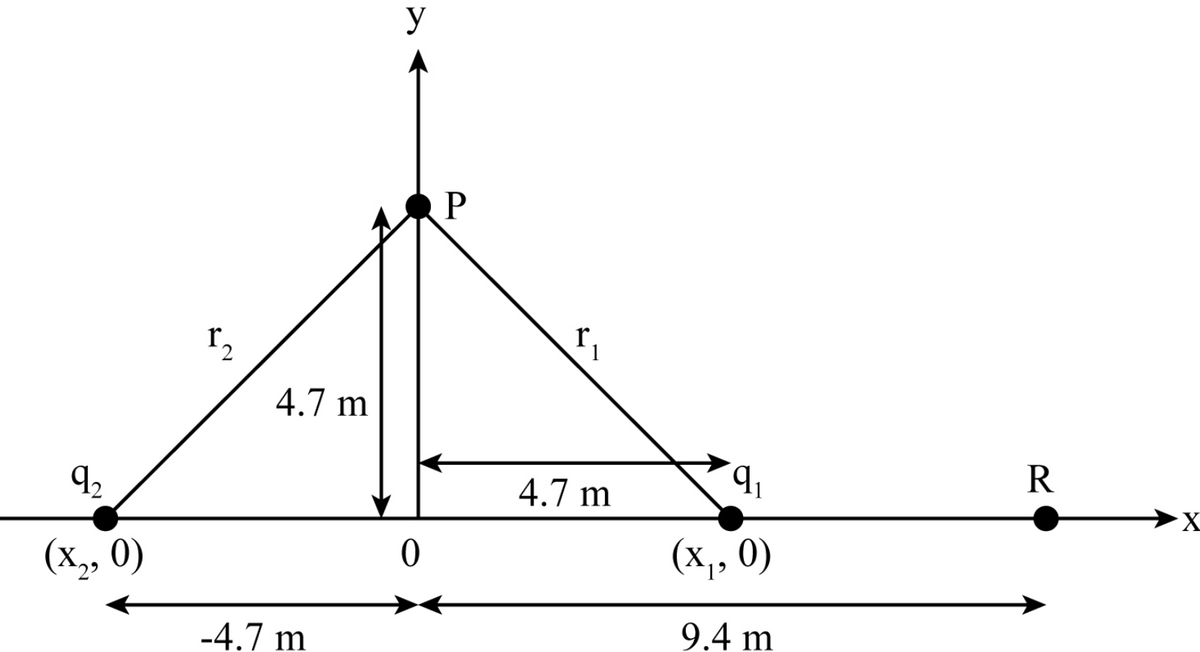Two point charges, q1 = -4.0 µC and q2 = 4.0 µC, are placed on the x axis at x1 = 4.7 m and x2 = -4.7 m, respectively (see figure below). y P 92 R (х, 0) (X1, 0) (a) What are the electric potentials at the points P (0, 4.7 m) and R (9.4 m, 0)? Vp = 0 VR = Enter a number. differs from the correct answer by more than 10%. Double check your calculations. V (b) Find the work done in moving a 1.0-µC charge from P to R along a straight line joining the two points. (c) Is there any path along which the work done in moving the charge from P to R is less than the value from part (b)? Explain. O Yes, because the work done depends only on the length of the path chosen. O No, because the work done doesn't depend on the change in potential. O Yes, because the change in potential will vary depending on the path chosen. O No, because the work done depends only on the change in potential.
Two point charges, q1 = -4.0 µC and q2 = 4.0 µC, are placed on the x axis at x1 = 4.7 m and x2 = -4.7 m, respectively (see figure below). y P 92 R (х, 0) (X1, 0) (a) What are the electric potentials at the points P (0, 4.7 m) and R (9.4 m, 0)? Vp = 0 VR = Enter a number. differs from the correct answer by more than 10%. Double check your calculations. V (b) Find the work done in moving a 1.0-µC charge from P to R along a straight line joining the two points. (c) Is there any path along which the work done in moving the charge from P to R is less than the value from part (b)? Explain. O Yes, because the work done depends only on the length of the path chosen. O No, because the work done doesn't depend on the change in potential. O Yes, because the change in potential will vary depending on the path chosen. O No, because the work done depends only on the change in potential.
College Physics
11th Edition
ISBN:9781305952300
Author:Raymond A. Serway, Chris Vuille
Publisher:Raymond A. Serway, Chris Vuille
Chapter1: Units, Trigonometry. And Vectors
Section: Chapter Questions
Problem 1CQ: Estimate the order of magnitude of the length, in meters, of each of the following; (a) a mouse, (b)...
Related questions
Question

Transcribed Image Text:Two point charges, q1 =
-4.0 µC and q2 = 4.0 µC, are placed on the x axis at X1 = 4.7 m and x2
-4.7 m, respectively (see figure below).
=
P
92
R
(x2, 0)
(X1, 0)
(a) What are the electric potentials at the points P (0, 4.7 m) and R (9.4 m, 0)?
Vp = 0
V
VR
Enter a number. differs from the correct answer by more than 10%. Double check your calculations. V
(b) Find the work done in moving a 1.0-µC charge from P to R along a straight line joining the two points.
(c) Is there any path along which the work done in moving the charge from P to R is less than the value from part (b)? Explain.
Yes, because the work done depends only on the length of the path chosen.
No, because the work done doesn't depend on the change in potential.
Yes, because the change in potential will vary depending on the path chosen.
No, because the work done depends only on the change in potential.
Need Help?
Read It
Expert Solution
Part (a)
Given
- The charge at x1 is .
- The charge at x2 is .
- The distance between origin to x1 is .
- The distance between origin to x2 is . Here negative sign only shows that the point is on - x-axis.
- The distance of the point P from the origin is .
- The distance of the point R from the origin is .
The schematical diagram of the charges is shown as,

The distance between charges and point P is calculated as,
The potential at point P is calculated as,
Here, k is the coulomb constant whose value is .
The distance between the charge and the point R is calculated as,
The distance between the charge and the point R is calculated as,
The potential at point R is calculated as,
Thus, the potential at point R is -6000 Nm.
Trending now
This is a popular solution!
Step by step
Solved in 3 steps with 1 images

Knowledge Booster
Learn more about
Need a deep-dive on the concept behind this application? Look no further. Learn more about this topic, physics and related others by exploring similar questions and additional content below.Recommended textbooks for you

College Physics
Physics
ISBN:
9781305952300
Author:
Raymond A. Serway, Chris Vuille
Publisher:
Cengage Learning

University Physics (14th Edition)
Physics
ISBN:
9780133969290
Author:
Hugh D. Young, Roger A. Freedman
Publisher:
PEARSON

Introduction To Quantum Mechanics
Physics
ISBN:
9781107189638
Author:
Griffiths, David J., Schroeter, Darrell F.
Publisher:
Cambridge University Press

College Physics
Physics
ISBN:
9781305952300
Author:
Raymond A. Serway, Chris Vuille
Publisher:
Cengage Learning

University Physics (14th Edition)
Physics
ISBN:
9780133969290
Author:
Hugh D. Young, Roger A. Freedman
Publisher:
PEARSON

Introduction To Quantum Mechanics
Physics
ISBN:
9781107189638
Author:
Griffiths, David J., Schroeter, Darrell F.
Publisher:
Cambridge University Press

Physics for Scientists and Engineers
Physics
ISBN:
9781337553278
Author:
Raymond A. Serway, John W. Jewett
Publisher:
Cengage Learning

Lecture- Tutorials for Introductory Astronomy
Physics
ISBN:
9780321820464
Author:
Edward E. Prather, Tim P. Slater, Jeff P. Adams, Gina Brissenden
Publisher:
Addison-Wesley

College Physics: A Strategic Approach (4th Editio…
Physics
ISBN:
9780134609034
Author:
Randall D. Knight (Professor Emeritus), Brian Jones, Stuart Field
Publisher:
PEARSON